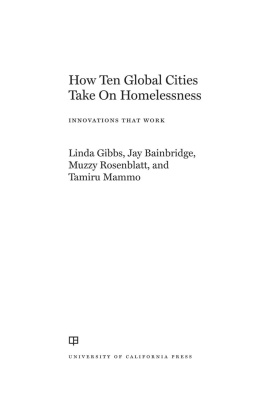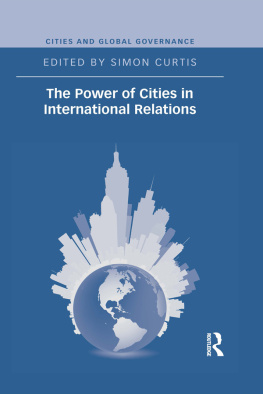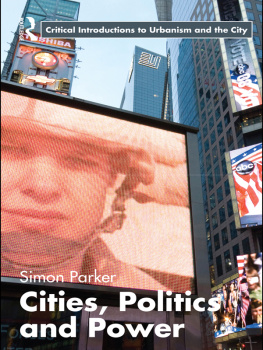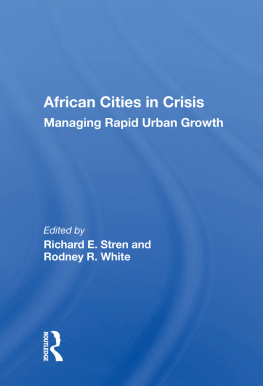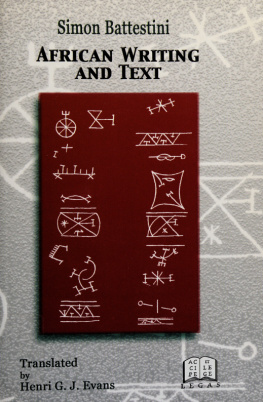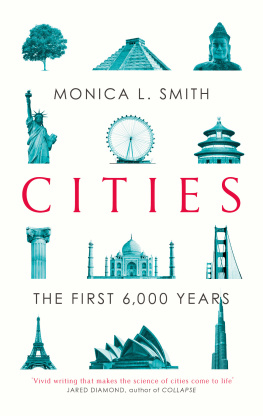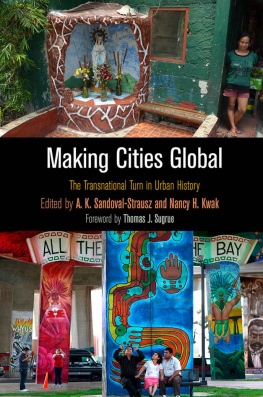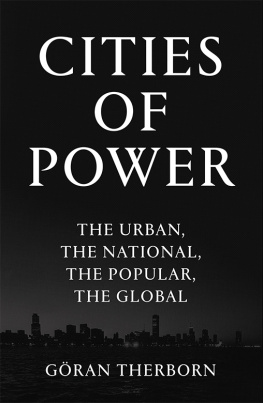Published in 2021 by African Minds
4 Eccleston Place, Somerset West, 7130, Cape Town, South Africa
www.africanminds.org.za

2021 African Minds
All contents of this document, unless specified otherwise, are licensed under a
Creative Commons Attribution 4.0 International License.
The views expressed in this publication are those of the authors.
When quoting from any of the chapters, readers are requested to acknowledge the relevant author.
ISBN (paper): 978-1-928502-15-9
eBook edition: 978-1-928502-16-6
ePub edition: 978-1-928502-17-3
Copies of this book are available for free download at:
www.africanminds.org.za
ORDERS:
African Minds
Email:
To order printed books from outside Africa, please contact:
African Books Collective
PO Box 721, Oxford OX1 9EN, UK
Email:
Contents
Preface Gran Therborn
Introduction Simon Bekker, Sylvia Croese and Edgar Pieterse
Part I The national in urban Africa
Introduction to Part I Simon Bekker
National projects in a postcolonial capital city: The example of Yaound Jean-Pierre Togolo
Lip service: How voices from informal settlements were sidelined during the first decade of local democracy in South Africa Liela Groenewald
Centralised urban governance in the Greater Cairo City Region: A critical understanding of key challenges and responses Amr Abdelaal, Hajer Awatta, Omar Nagati, Salwa Salman and Marwa Shykhon
Traditional chiefs and traditional authority in Kinshasa Philippe Ibaka Sangu
Part II The popular in urban Africa
Introduction to Part II Sylvia Croese
Local government as the stage for resistance: Strategies and tactics of opposing mega projects in Gauteng Margot Rubin
Popular protests and the limits of civil society in the struggle for democracy in Zimbabwe, 2011 to 2016 Ngonidzashe Marongwe
We will be back to the street!: Protest and the empires of water in Nairobi Wangui Kimari
Part III The global in urban Africa 111
Introduction to Part III Edgar Pieterse
Africas new Dubai? Intersections between the global and the local in the redevelopment of the Bay of Luanda, Angola Sylvia Croese
Urban governance and smart future cities in Nigeria: Lagos flagship projects as springboard? Muyiwa Elijah Agunbiade, Oluwafemi Olajide and Hakeem Bishi
The governance of Addis Ababa Light Rail Transit Meseret Kassahun
Conclusion: African cities in the world of today and tomorrow Gran Therborn and Alan Mabin
List of contributors
Index
Urban scholarship is a forte of social science in Africa and a proper response to urban change and innovation. Africa south of the Sahara has been very under-urbanised for a long time but currently is undergoing rapid urbanisation, sometimes, as in Congolese Kinshasa, with a problematic originality of massive urbanisation without any substantial industrialisation or other economic development. Recent years have witnessed an urban building boom from Dakar to Dar es Salaam. Lagos, Luanda, Nairobi and others have set out the goal to become world-class cities.
This volume arises from a conference hosted by the Stellenbosch Institute for Advanced Study (STIAS) in 2017, with the kind and decisive support of its then director Hendrik Geyer, and the African Centre for Cities (ACC) of the University of Cape Town. The conference brought together over 30 scholars representing a range of different disciplines from across the African continent and beyond, including a number of young talented African scholars. It was a conference on African cities which looked at the refractions of the national, the popular and the global, analysed in my global study, Cities of Power, of which the conference was also an African launch.
The national refers to the constitution of nation-states, of states representing the nation, and not a colonial empire or a local king. It meant a nationalisation of cities, in their layout, organisation, architecture and symbolism. In Africa, and in the whole vast ex-colonial zone, the nation-state was established through independence from the colonial power. In most of Europe, it meant a peoples constituting itself as a nation independent of the king. South Africa was set up as a settler state, like the Americas and Australia, as a nation of European settlers making themselves independent of their motherland. The country became an African nation-state only in the 1990s, with the fall of racist settler rule.
Popular moments have occurred when popular forces challenge the rule of the national elite, demanding cities built for and serving the mass of ordinary people. Popular forces are non-ruling nonelites whose ranks may comprise different characteristics, of class, caste, ethnicity, gender, occasionally religion, as in the ongoing conflict in Bahrein between the Sunni dynasty and the Shia majority of the people. From an urban studies perspective, a popular moment is not quite the same as the rise of a protest movement. The former refers to successful challenges and protests which have an effect on the city.
Global moments happen when global status and attraction become predominant city aspirations. Historically there have so far been two such moments in modern times. The first had its zenith in the decades around 1900 and was a globalisation of nationalism. Cities worthy of the nation had to be built, all over Europe, the Americas, and a few Asian cities, like Tokyo. Paris of the second empire was then the main urban model, with London offering the best infrastructural example, of sanitation, sewage, clean water and electricity. In most of Asia and in the whole of Africa there were then no nations with states, so here the first global moment passed by. The second urban global moment arrived in the late 20th century in the wake of industrial outsourcing, de-industrialisation, footloose financial capital, globalised real estate markets and mass tourism, as the global moment of capital. Attracting foreign investment, foreign business headquarters and solvent tourists became primary big city goals. Becoming a global city or a world-class city has replaced the previous moments city worthy of the nation.
Both global moments have meant importing global influences and aspiring to global recognition and fame, by national and local politicians and capital. They are not actively imposed from the outside by global forces. The editors have then done a tremendous job turning the conference into a publication. In its geographical scope, from Cairo to Johannesburg, and in its thematic range, from efforts at national city impregnation in Yaound, national-local government relations in Cairo, Addis, Kinshasa, Tshwane and Johannesburg, to popular rebellions in Nairobi and Harare, and further to top-down globalist planning in the local contexts of Lagos and Luanda, this is a major example of the vigour of African urban scholarship.
Thanks go out to STIAS, to its then Director Hendrik Geyer, to Christoff Pauw, Programme Manager, and Nel-Mari Loock, Programme Administrator, for making the conference happen. Thanks also to those who presented and participated in the conference but could not participate in the publication, especially Eduardo Moreno, Frederick Golooba-Mutebi, Philip Harrison, Susan Parnell, Sophie Oldfield, Ntombini Marrengane, Glen Robbins, Lindsay Sawyer and Ngaka Mosiane. Thanks go out to NRF funding for the South African Research Chair in Urban Policy, held by Edgar Pieterse, which allowed for the translation into English of two chapters originally written in French. Thanks for funding of this publication go out to STIAS, the NRF South African Research Chair in Urban Policy at the University of Cape Town, and Stellenbosch University. Appreciation is extended to the Partnership for African Social and Governance Research (PASGR) that enabled the research for chapters 9 to 11. A special thanks to Sylvia Croese and Simon Bekker for pulling everything together.



 2021 African Minds
2021 African Minds

